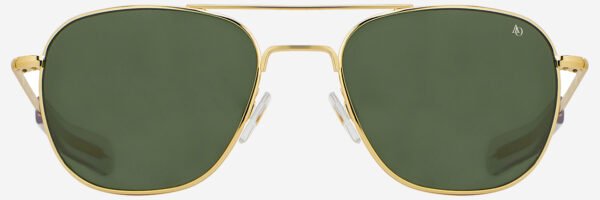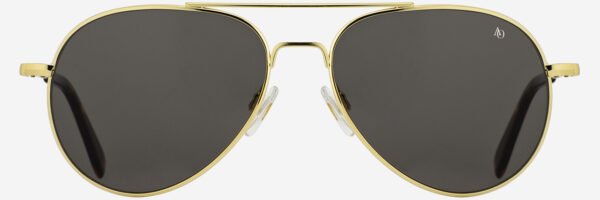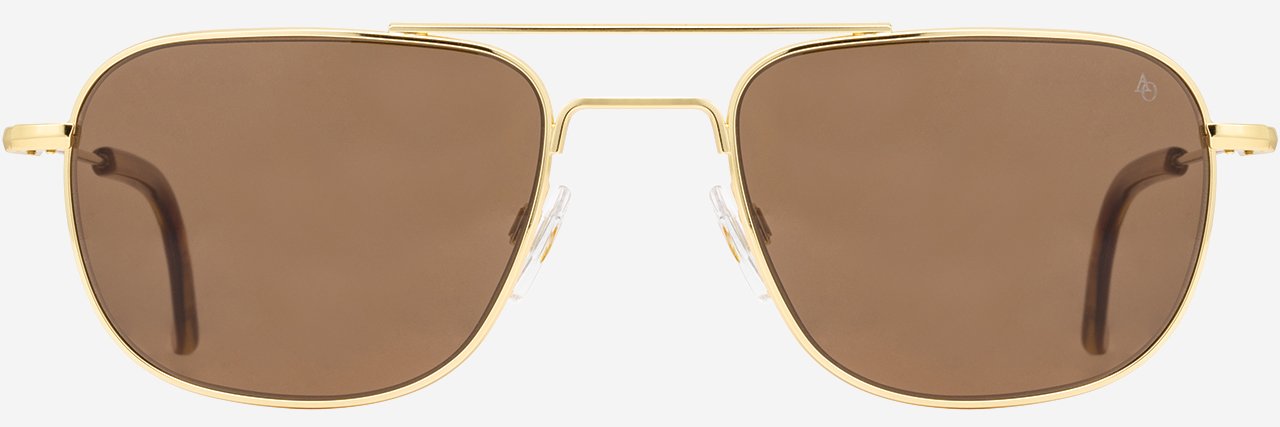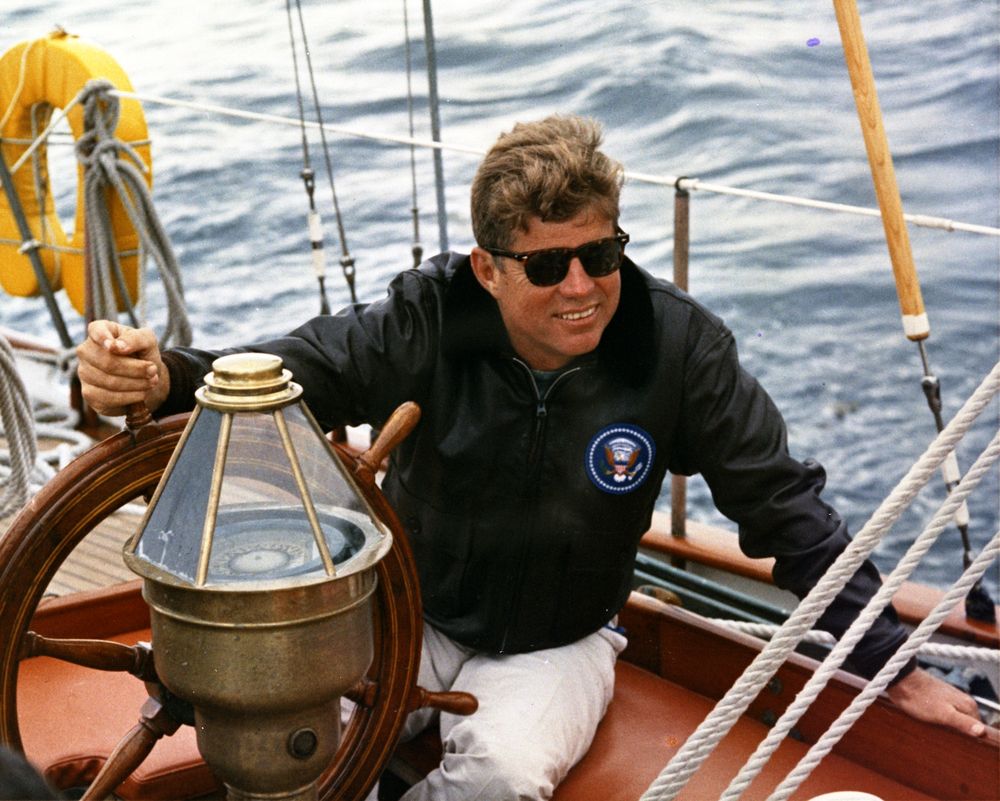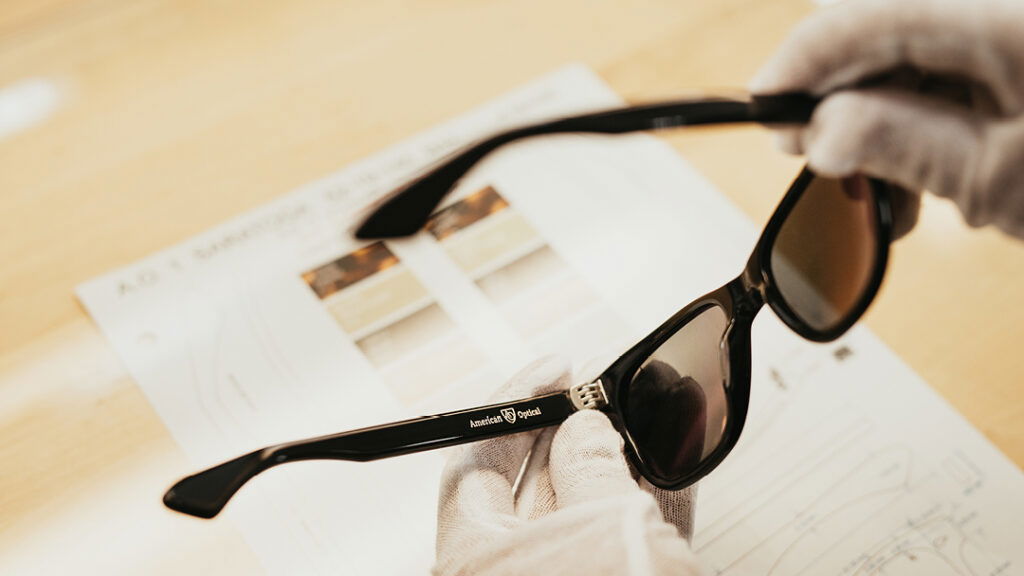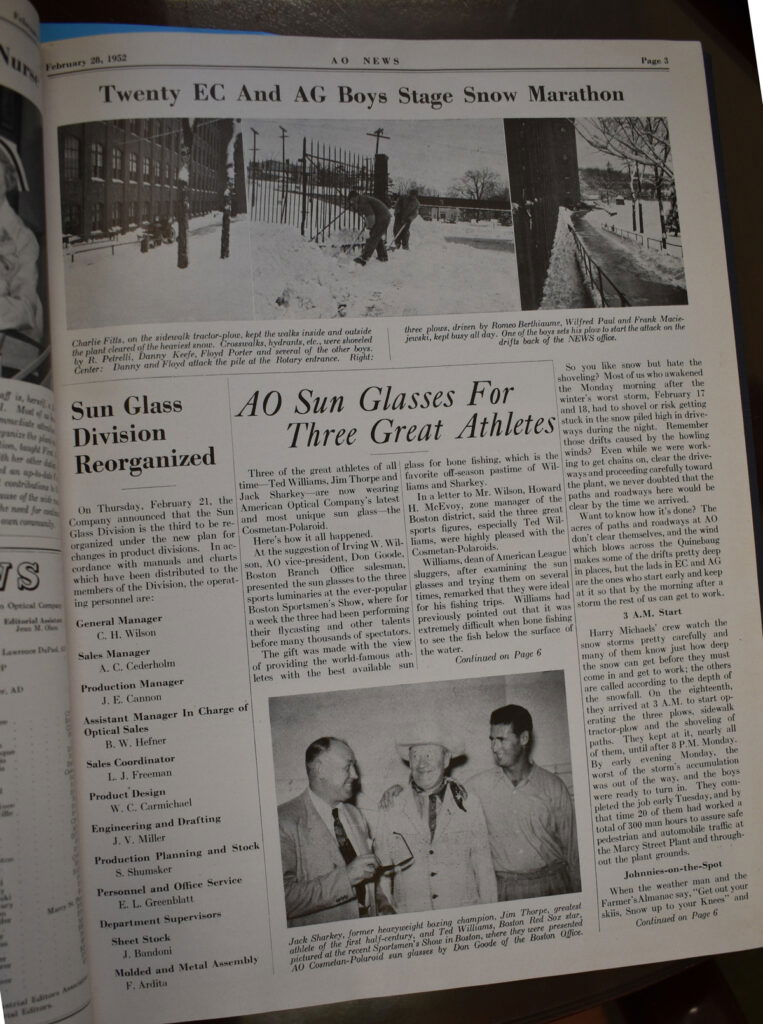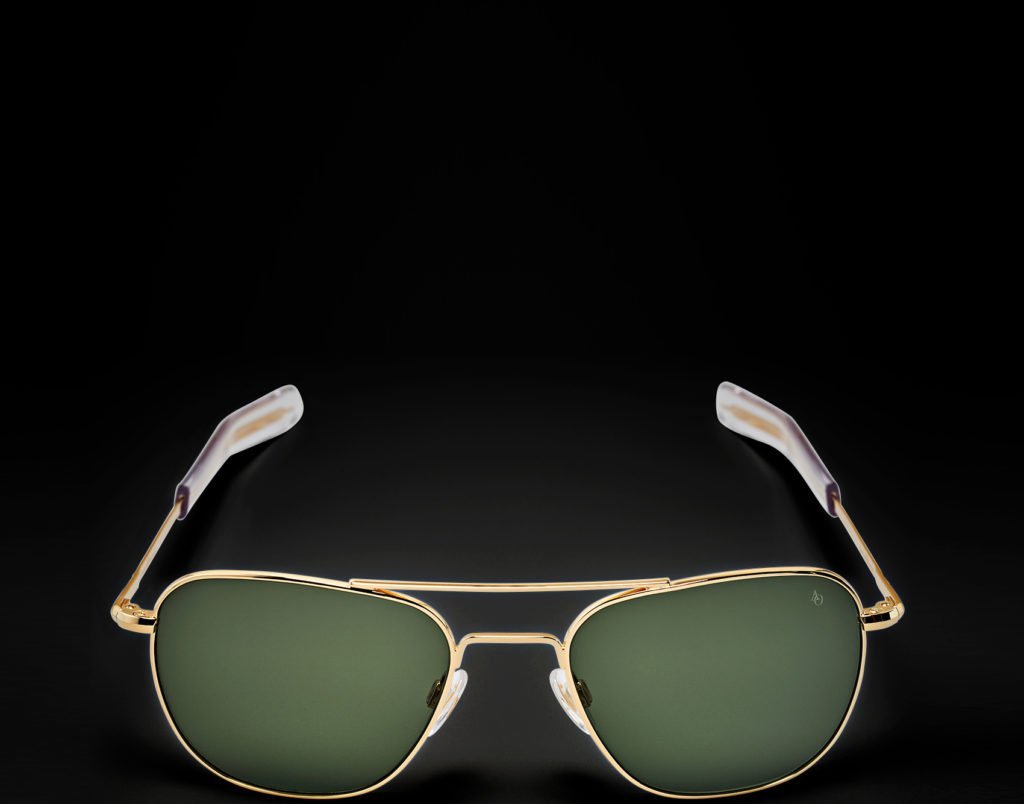Should You Wear Polarized Sunglasses for Sports?
Wearing Polarized Sunglasses for Sports: Should You Make the Switch?
Whether you’re a seasoned athlete or a weekend warrior, the choice of eyewear can significantly impact your performance. You have a lot of choices between glasses, sports glasses, sunglasses, and polarized sunglasses. Discover the advantages and potential drawbacks of wearing polarized sunglasses when it comes to sports.
Find out if lens polarization is right for your favorite activities and explore the diverse palette of lenses that American Optical offers.
What Are the Special Characteristics of Polarized Lenses?
Polarized sunglasses have lenses that are specially designed to reduce glare from reflective surfaces, such as water, snow, and roads. Glare occurs when light reflects off a surface in a way that it becomes concentrated and intense, leading to discomfort and reduced visibility.
Polarized lenses work by incorporating a special filter that blocks certain types of light waves, selectively allowing only specific orientations of light to pass through.
Here’s how polarized lenses work:
Light travels in waves, and when it hits a surface, it can become polarized. This means the light waves align in a particular direction parallel to the reflecting surface.
Polarized lenses contain a special polarizing filter that is vertically oriented. This filter is typically made of a special material that can absorb or block horizontally polarized light.
When horizontally polarized light (glare) reflects off a surface, the polarizing filter in the lens blocks these horizontally oriented light waves. As a result, much of the intense, reflected light is eliminated.
This offers many visual advantages including:
- Elimination of Glare: The reduction in glare from polarized glasses enhances visibility in direct sunlight and minimizes eye strain, making them ideal for various outdoor recreation.
- Enhanced Contrast and Clarity: One of the key benefits of wearing polarized lenses is their ability to enhance contrast and clarity. By filtering out scattered and reflected light, these lenses provide a sharper and more defined visual experience, particularly in bright and sunny conditions, and can reduce eye fatigue.
- Reduction of Harmful Sun Rays: Polarized lenses effectively block harmful ultraviolet (UV) rays from the sun, to protect your eyes. This feature is crucial for maintaining eye health, especially during prolonged exposure to harmful light.
- Improved Visibility in Specific Terrains: Different lens colors cater to specific terrains and lighting conditions. Whether you’re on the water, in the snow, or traversing diverse landscapes, polarized lenses can be customized to offer better visibility based on your surroundings.
Are Polarized Sunglasses Good for Sports?
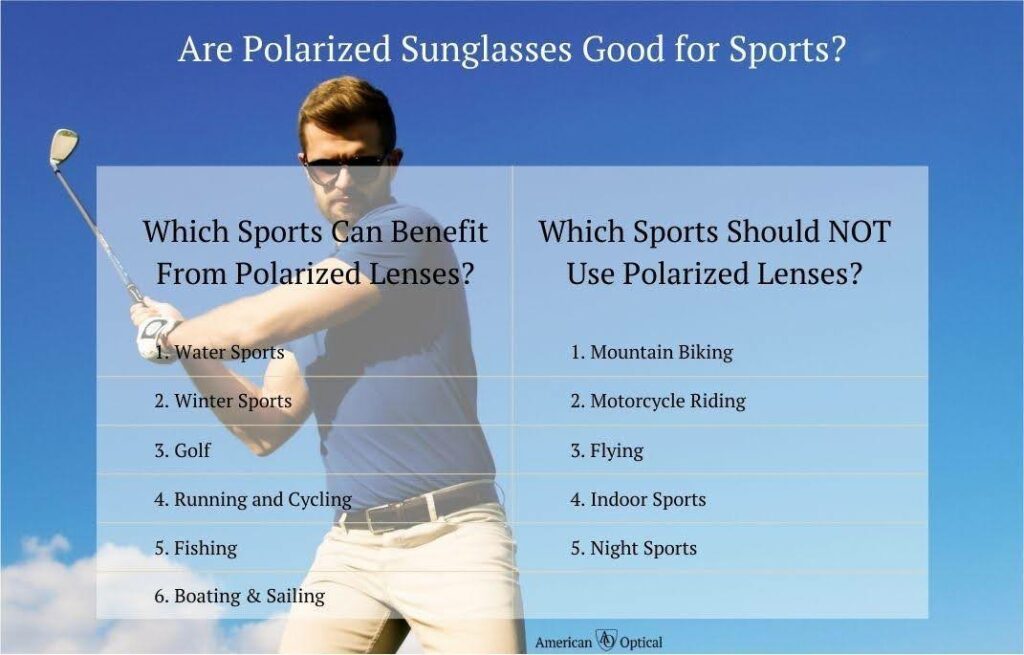
The effectiveness of polarized sunglasses in outdoor sports hinges on various factors and the nature of the sport itself. It’s essential to weigh the pros and cons before making a decision.
Polarized lenses are generally beneficial not just for protection from UV rays, but for reducing glare and enhancing visibility, but their suitability can depend on the type of sport. For fast-paced activities in bright light where quick reactions are crucial, wearing polarized lenses may be a game-changer.
However, when playing sports that involve constant changes in lighting conditions or require a high level of depth perception, such as tennis or basketball, wearing a polarized lens might not be the optimal choice.
Which Sports Can Benefit From Polarized Lenses?
For water sports, winter adventures, golf, running, cycling, fishing, boating, and sailing, polarized glasses can provide a competitive edge. Explore the advantages tailored to each sport below.
1. Water Sports
Polarized lenses excel in reducing blinding glare off the water, enhancing vision for activities like surfing and kayaking. The ability to see beneath the water’s surface can be a significant advantage for anglers, enabling them to spot fish more easily with less danger from UV rays.
2. Winter Sports
Snowy landscapes pose no challenge with polarized lenses, offering superior clarity for skiing and snowboarding. The reduction of glare from the snow and bright sunlight allows winter sports enthusiasts to navigate slopes with enhanced precision.
3. Golf
Accurate color perception is crucial in golf, making gray lenses ideal for reducing overall brightness. Golfers benefit from improved contrast on the green, aiding in reading the contours of the course and judging distances accurately. Wear polarized lenses and see if you knock any strokes off your game.
4. Running or Cycling
Polarized glasses cut glare and enhance visibility, providing runners with clear sight during outdoor runs. This can be especially beneficial in sunny conditions, helping runners stay focused on the path ahead without being hindered by glare when they wear polarized lenses.
Cyclists benefit from reduced glare and improved contrast, especially when navigating varied terrains. Whether road cycling through urban landscapes or hitting off-road trails, polarized glasses contribute to a clearer view of the road or trail, enhancing safety and performance.
5. Fishing
Brown or amber lenses are perfect for anglers, enhancing contrast and aiding in spotting fish in water. The ability to see beyond surface glare allows fishermen to identify subtle movements beneath the water, improving their chances of a successful catch.
6. Boating & Sailing
Navigating reflective water surfaces becomes easier with polarized lenses, reducing eye strain. Boaters and sailors can enjoy a more comfortable and safer experience on the water, thanks to enhanced visibility and reduced glare from harmful rays of sunlight reflecting off the water.
Which Sports Might NOT Benefit from Polarized Lenses?
While polarized glasses offer advantages when playing sports, certain sports may be better suited to other eyewear options. Consider the following:
1. Mountain Biking
Mountain bikers should try to test out polarized sunglasses to gauge their impact. Polarized sports sunglasses may distort trail details, impacting performance in mountain biking. In situations where quick reactions and precise depth perception are crucial, non-polarized sunglasses may be a more suitable choice.
2. Motorcycle Riding
Fast-changing conditions on the road may pose challenges with polarized sunglasses. Riders need to be aware of potential visibility issues, especially in unpredictable lighting conditions or when relying on instrument screen displays. However, riders may find the vision clarity they get from polarized sunglasses is a bigger benefit.
3. Flying
Polarized lenses can interfere with critical instrument readings for pilots. Aviation requires clear and unobstructed vision of instruments, and pilots may find that non-polarized lenses are more suitable for this purpose. Pilots should also check with their employers as to requirement for sunglasses worn during flight.
4. Indoor Sports
Polarized lenses aren’t necessary in well-lit indoor environments and may affect vision. Sports played indoors, such as basketball or volleyball, where consistent and even lighting is provided, may not require polarization.
5. Night Sports
Reduced visibility at night makes polarized sunglasses unsuitable for nocturnal activities. In low-light conditions, such as night running or night cycling, non-polarized lenses or sports glasses may be a better choice to ensure optimal visibility.
6. Ball Sports
Tracking fast-moving balls may be challenging with the polarization effect. Sports like tennis or baseball, where following the trajectory of a fast-moving ball is crucial, may not benefit from polarized sunglasses, as they can potentially hinder depth perception. On the other hand, increased color definition could offer an edge.
Benefits of Wearing Polarized Sunglasses for Sports
There are many advantages to wearing polarized sunglasses while playing sports. Let’s explore them:
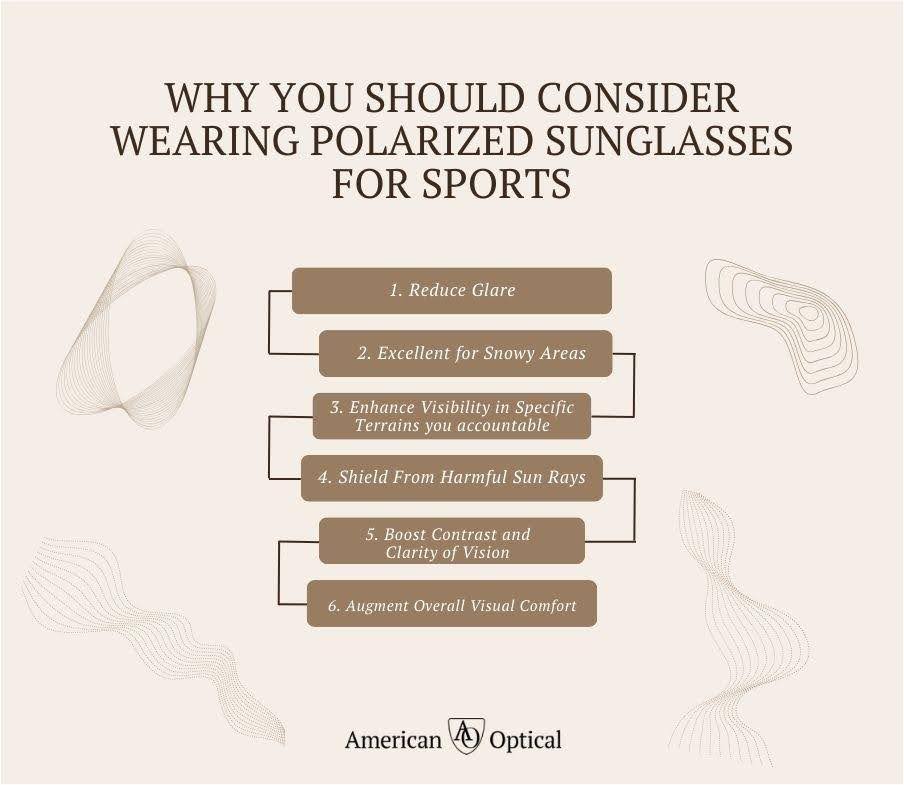
1. Glare Reduction
Polarized sunglasses improve visibility by eliminating glare from surfaces. This is particularly beneficial in activities where reflective surfaces, such as flat water or snow, can cause discomfort and hinder performance.
2. Excellent for Snowy Areas
Navigate snowy landscapes with improved clarity. Skiers and snowboarders can enjoy enhanced contrast and greater clarity, making it easier to discern variations in terrain and navigate slopes with confidence.
3. Enhance Visibility in Specific Terrains
Tailor your eyewear to the demands of your sport. Whether you’re on the water, on the golf course, or running on varied surfaces, when you wear polarized sunglasses, you can optimize visibility for specific terrains and lighting conditions.
4. Shield From Harmful Sun Rays
Protect your eyes from the sun’s harmful rays during outdoor activities. Prolonged exposure to UVA and UVB rays can be harmful to the eyes, and polarized lenses provide an additional layer of eye protection against UV radiation.
5. Boost Contrast and Clarity of Vision
Enjoy crisp, clear vision for optimal performance. The enhanced contrast provided by polarized lenses contributes to a more vivid and detailed visual experience, essential for activities that demand precision.
6. Augment Overall Visual Comfort
Reduce eye strain and fatigue during extended activities. The reduction of glare and improved clarity offered by polarized lenses contributes to a more comfortable and enjoyable experience, especially during prolonged, outdoor sports sessions.
Some Drawbacks to Consider
Be aware of potential downsides of opting for polarized sunglasses:
1. Tend to Be More Expensive
Quality polarized lenses can come with a higher price tag. While the benefits may justify the cost for some users, budget considerations may influence the decision to opt for polarized lenses.
Depending on your lifestyle, you may prefer specialized sports sunglasses.
2. Can Complicate the Viewing of LCD Displays
Polarization may affect visibility on LCD screens. Users relying heavily on electronic displays, such as cyclists with bike computers or pilots, may experience difficulty viewing these LCD screens with polarized lenses.
3. Might Affect Depth Perception
Some users report challenges with depth perception while wearing a polarized lens. Activities that require precise depth perception, such as certain sports or tasks where accurate judgment of distances is crucial, may be impacted by the polarization effect.
4. Ineffective in Certain Conditions
Foggy or low-light situations may diminish effectiveness. In scenarios where visibility is reduced due to fog or low light, polarized lenses may not offer the same level of performance as they do in bright, sunny conditions.
What Color Polarized Lenses Is Best for Sports?
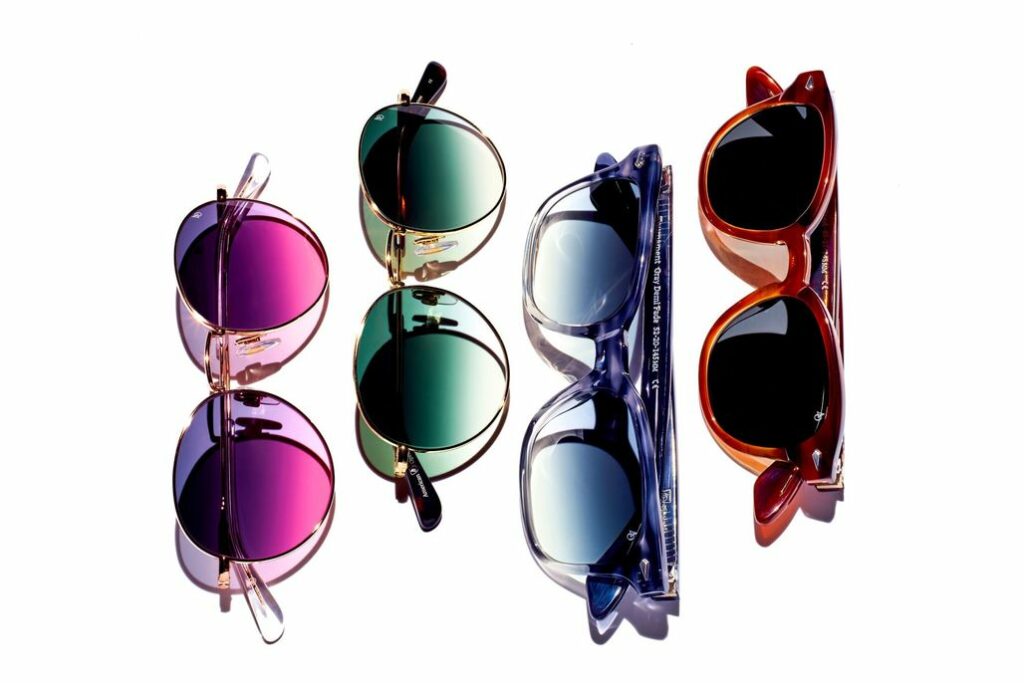
The ideal color for polarized lenses largely depends on the sport and the lighting conditions. American Optical offers a variety of polarized lens colors, each suited to specific activities:
- Gray: Perfect for general outdoor activities, a gray polarized lens reduces glare and overall brightness without distorting color. Ideal for running or golf where accurate color perception is essential.
- Brown/Amber: Enhances contrast, making this polarized lens color a top choice for fishing or playing baseball. They help in spotting fish in water or tracking balls against the sky.
- Rose/Red: This color polarized lens heightens contrast against blue and green backdrops, making them suited for skiing or mountain biking where distinguishing terrain details is crucial.
Find Your Perfect Pair of Polarized Sunglasses at American Optical
Summing things up, American Optical offers a diverse range of polarized sunglasses to help enhance your performance in various sports. Elevate your sports performance with top-quality eyewear from American Optical – discover the collection and find your perfect pair today.
For more information about how polarized lenses work or sports sunglasses recommendations, please contact us. You may also want to check with your eye doctor on what sports glasses are best for your purposes.
Whether you’re chasing waves, conquering mountains, or perfecting your golf swing, make American Optical your trusted companion for sports eyewear.
